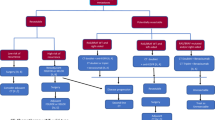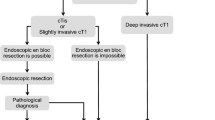Abstract
Purpose
Colorectal cancer is the most common gastrointestinal tumor in China. While significant progress has been achieved in traditional chemotherapy, radiotherapy, and targeted therapy, the prognosis of advanced colorectal cancer is poor, and the five-year survival rate is unsatisfactory. There is an urgent need to explore new treatment modalities. In this review, we examined the latest progress of colorectal cancer immunotherapy and discussed its future prospects.
Methods
We conducted a literature review to sort out the current status of immunotherapy for different types of colorectal cancer and discussed potential combination therapy options. Results Subsequent line therapy, first-line therapy and neoadjuvant therapy for MSI-H/dMMR colorectal cancer are discussed. In addition, combination therapy options for patients with MSS/pMMR colorectal cancer are presented. Finally, current valuable biomarkers for immunotherapy are highlighted.
Results
Subsequent line therapy, first-line therapy and neoadjuvant therapy for MSI-H/dMMR colorectal cancer are discussed. In addition, combination therapy options for patients with MSS/pMMR colorectal cancer are presented. Finally, current valuable biomarkers for immunotherapy are highlighted.
Conclusion
This review discussed the current status of immunotherapy for different types of colorectal cancer and biomarkers for immunotherapy.

Similar content being viewed by others
Data availability
All supporting data are included within the article.
References
Zheng R, Zhang S, Zeng H, Wang S, Sun K, Chen R et al (2022) Cancer incidence and mortality in China, 2016. J Natl Cancer Cent 2(1):1–9
Marabelle A, Le DT, Ascierto PA, Di Giacomo AM, De Jesus-Acosta A, Delord JP et al (2020) Efficacy of pembrolizumab in patients with noncolorectal high microsatellite instability/mismatch repair-deficient cancer: results from the phase II KEYNOTE-158 study. J Clin Oncol 38(1):1–10
Cui M, Li P, Mao Y, Zhang L, Xia P, Liu E et al (2020) Implication of microsatellite instability in Chinese cohort of human cancers. Cancer Manag Res 12:10287–10295
Salem ME, Puccini A, Grothey A, Raghavan D, Goldberg RM, Xiu J et al (2018) Landscape of tumor mutation load, mismatch repair deficiency, and PD-L1 expression in a large patient cohort of gastrointestinal cancers. Mole Cancer Res 16(5):805–812
Asaoka Y, Ijichi H, Koike K (2015) PD-1 blockade in tumors with mismatch-repair deficiency. N Engl J Med 373(20):1979
Le DT, Kim TW, Van Cutsem E, Geva R, Jäger D, Hara H et al (2020) Phase II open-label study of pembrolizumab in treatment-refractory, microsatellite instability-high/mismatch repair-deficient metastatic colorectal cancer: KEYNOTE-164. J Clin Oncol 38(1):11–19
Overman MJ, McDermott R, Leach JL, Lonardi S, Lenz HJ, Morse MA et al (2017) Nivolumab in patients with metastatic DNA mismatch repair-deficient or microsatellite instability-high colorectal cancer (CheckMate 142): an open-label, multicentre, phase 2 study. Lancet Oncol 18(9):1182–1191
André T, Lonardi S, Wong KYM, Lenz HJ, Gelsomino F, Aglietta M et al (2022) Nivolumab plus low-dose ipilimumab in previously treated patients with microsatellite instability-high/mismatch repair-deficient metastatic colorectal cancer: 4-year follow-up from CheckMate 142. Ann Oncol 33(10):1052–1060
Li J, Deng Y, Zhang W, Zhou AP, Guo W, Yang J et al (2021) Subcutaneous envafolimab monotherapy in patients with advanced defective mismatch repair/microsatellite instability high solid tumors. J Hematol Oncol 14(1):95
Chen J, Quan M, Chen Z, Zeng T, Li Y, Zhou Y et al (2020) Camrelizumab in advanced or metastatic solid tumour patients with DNA mismatch repair deficient or microsatellite instability high: an open-label prospective pivotal trial. J Cancer Res Clin Oncol 146(10):2651–2657
Overman MJ, Lonardi S, Wong KYM, Lenz HJ, Gelsomino F, Aglietta M et al (2018) Durable clinical benefit with nivolumab plus ipilimumab in DNA mismatch repair-deficient/microsatellite instability-high metastatic colorectal cancer. J Clin Oncol 36(8):773–779
Lenz HJ, Van Cutsem E, Luisa Limon M, Wong KYM, Hendlisz A, Aglietta M et al (2022) First-line nivolumab plus low-dose ipilimumab for microsatellite instability-high/mismatch repair-deficient metastatic colorectal cancer: the phase II CheckMate 142 study. J Clin Oncol 40(2):161–170
Kopetz S, Guthrie KA, Morris VK, Lenz HJ, Magliocco AM, Maru D et al (2021) Randomized trial of irinotecan and cetuximab with or without vemurafenib in BRAF-mutant metastatic colorectal cancer (SWOG S1406). J Clin Oncol 39(4):285–294
André T, Shiu KK, Kim TW, Jensen BV, Jensen LH, Punt C et al (2020) Pembrolizumab in microsatellite-instability-high advanced colorectal cancer. N Engl J Med 383(23):2207–2218
Yang X, Yin R, Xu L (2018) Neoadjuvant PD-1 blockade in resectable lung cancer. N Engl J Med 379(9):e14
Necchi A, Anichini A, Raggi D, Briganti A, Massa S, Lucianò R et al (2018) Pembrolizumab as neoadjuvant therapy before radical cystectomy in patients with muscle-invasive urothelial bladder carcinoma (PURE-01): an open-label, single-arm, phase II study. J Clin Oncol 36(34):3353–3360
Chalabi M, Fanchi LF, Dijkstra KK, Van den Berg JG, Aalbers AG, Sikorska K et al (2020) Neoadjuvant immunotherapy leads to pathological responses in MMR-proficient and MMR-deficient early-stage colon cancers. Nat Med 26(4):566–576
Bando H, Tsukada Y, Inamori K, Togashi Y, Koyama S, Kotani D et al (2022) Preoperative chemoradiotherapy plus nivolumab before surgery in patients with microsatellite stable and microsatellite instability-high locally advanced rectal cancer. Clin Cancer Res 28(6):1136–1146
Llosa NJ, Cruise M, Tam A, Wicks EC, Hechenbleikner EM, Taube JM et al (2015) The vigorous immune microenvironment of microsatellite instable colon cancer is balanced by multiple counter-inhibitory checkpoints. Cancer Discov 5(1):43–51
O’Neil BH, Wallmark JM, Lorente D, Elez E, Raimbourg J, Gomez-Roca C et al (2017) Safety and antitumor activity of the anti-PD-1 antibody pembrolizumab in patients with advanced colorectal carcinoma. PLoS ONE 12(12):e0189848
Ebert PJR, Cheung J, Yang Y, McNamara E, Hong R, Moskalenko M et al (2016) MAP kinase inhibition promotes T cell and anti-tumor activity in combination with PD-L1 checkpoint blockade. Immunity 44(3):609–621
Hellmann MD, Kim TW, Lee CB, Goh BC, Miller WH Jr, Oh DY et al (2019) Phase Ib study of atezolizumab combined with cobimetinib in patients with solid tumors. Ann Oncol 30(7):1134–1142
Eng C, Kim TW, Bendell J, Argilés G, Tebbutt NC, Di Bartolomeo M et al (2019) Atezolizumab with or without cobimetinib versus regorafenib in previously treated metastatic colorectal cancer (IMblaze370): a multicentre, open-label, phase 3, randomised, controlled trial. Lancet Oncol 20(6):849–861
Wu RY, Kong PF, Xia LP, Huang Y, Li ZL, Tang YY et al (2019) Regorafenib promotes antitumor immunity via inhibiting PD-L1 and IDO1 expression in melanoma. Clin Cancer Res 25(14):4530–4541
Doleschel D, Hoff S, Koletnik S, Rix A, Zopf D, Kiessling F et al (2021) Regorafenib enhances anti-PD1 immunotherapy efficacy in murine colorectal cancers and their combination prevents tumor regrowth. J Exp Clin Cancer Res 40(1):288
Fukuoka S, Hara H, Takahashi N, Kojima T, Kawazoe A, Asayama M et al (2020) Regorafenib plus nivolumab in patients with advanced gastric or colorectal cancer: an open-label, dose-escalation, and dose-expansion phase Ib trial (REGONIVO, EPOC1603). J Clin Oncol 38(18):2053–2061
Cousin S, Cantarel C, Guegan JP, Gomez-Roca C, Metges JP, Adenis A et al (2021) Regorafenib-avelumab combination in patients with microsatellite stable colorectal cancer (REGOMUNE): a single-arm, open-label, phase II trial. Clin Cancer Res 27(8):2139–2147
Wang C, Chevalier D, Saluja J, Sandhu J, Lau C, Fakih M (2020) Regorafenib and nivolumab or pembrolizumab combination and circulating tumor DNA response assessment in refractory microsatellite stable colorectal cancer. Oncologist 25(8):e1188–e1194
Li Q, Cheng X, Zhou C, Tang Y, Li F, Zhang B et al (2022) Fruquintinib enhances the antitumor immune responses of anti-programmed death receptor-1 in colorectal cancer. Front Oncol 12:841977
Sun L, Huang S, Li D, Mao Y, Wang Y, Wu J (2021) Efficacy and safety of fruquintinib plus PD-1 inhibitors versus regorafenib plus PD-1 inhibitors in refractory microsatellite stable metastatic colorectal cancer. Front Oncol 11:754881
Chen EX, Jonker DJ, Loree JM, Kennecke HF, Berry SR, Couture F et al (2020) Effect of combined immune checkpoint inhibition vs best supportive care alone in patients with advanced colorectal cancer: the Canadian Cancer Trials Group CO.26 Study. JAMA Oncol 6(6):831–838
Trotta AM, Ottaiano A, Romano C, Nasti G, Nappi A, De Divitiis C et al (2016) Prospective evaluation of cetuximab-mediated antibody-dependent cell cytotoxicity in metastatic colorectal cancer patients predicts treatment efficacy. Cancer Immunol Res 4(4):366–374
Schmoll HJ, Arnold D, de Gramont A, Ducreux M, Grothey A, O’Dwyer PJ et al (2018) MODUL-a multicenter randomized clinical trial of biomarker-driven maintenance therapy following first-line standard induction treatment of metastatic colorectal cancer: an adaptable signal-seeking approach. J Cancer Res Clin Oncol 144(6):1197–1204
Antoniotti C, Rossini D, Pietrantonio F, Catteau A, Salvatore L, Lonardi S et al (2022) Upfront FOLFOXIRI plus bevacizumab with or without atezolizumab in the treatment of patients with metastatic colorectal cancer (AtezoTRIBE): a multicentre, open-label, randomised, controlled, phase 2 trial. Lancet Oncol 23(7):876–887
Antoniotti C, Rossini D, Pietrantonio F, Salvatore L, Marmorino F, Ambrosini M et al (2023) FOLFOXIRI plus bevacizumab and atezolizumab as upfront treatment of unresectable metastatic colorectal cancer (mCRC): updated and overall survival results of the phase II randomized AtezoTRIBE study. 41(16_suppl):3500-
Martinelli E, Martini G, Famiglietti V, Troiani T, Napolitano S, Pietrantonio F et al (2021) Cetuximab rechallenge plus avelumab in pretreated patients with RAS wild-type metastatic colorectal cancer: the phase 2 single-arm clinical CAVE trial. JAMA Oncol 7(10):1529–1535
Lee LH, Cavalcanti MS, Segal NH, Hechtman JF, Weiser MR, Smith JJ et al (2016) Patterns and prognostic relevance of PD-1 and PD-L1 expression in colorectal carcinoma. Mod Pathol 29(11):1433–1442
Marabelle A, Fakih M, Lopez J, Shah M, Shapira-Frommer R, Nakagawa K et al (2020) Association of tumour mutational burden with outcomes in patients with advanced solid tumours treated with pembrolizumab: prospective biomarker analysis of the multicohort, open-label, phase 2 KEYNOTE-158 study. Lancet Oncol 21(10):1353–1365
Schrock AB, Ouyang C, Sandhu J, Sokol E, Jin D, Ross JS et al (2019) Tumor mutational burden is predictive of response to immune checkpoint inhibitors in MSI-high metastatic colorectal cancer. Ann Oncol 30(7):1096–1103
Forgó E, Gomez AJ, Steiner D, Zehnder J, Longacre TA (2020) Morphological, immunophenotypical and molecular features of hypermutation in colorectal carcinomas with mutations in DNA polymerase ε (POLE). Histopathology 76(3):366–374
Kim JH, Kim SY, Baek JY, Cha YJ, Ahn JB, Kim HS et al (2020) A phase II study of avelumab monotherapy in patients with mismatch repair-deficient/microsatellite instability-high or POLE-mutated metastatic or unresectable colorectal cancer. Cancer Res Treat 52(4):1135–1144
Wang F, Zhao Q, Wang YN, Jin Y, He MM, Liu ZX et al (2019) Evaluation of POLE and POLD1 mutations as biomarkers for immunotherapy outcomes across multiple cancer types. JAMA Oncol 5(10):1504–1506
Funding
This study was supported by the Natural Science Foundation of Anhui (Grant Number is 2108085MH290, Y Zhu), the Scientific Research Fund Project for Talent Introduction of Yijishan Hospital, Wannan Medical College in China (Grant Number is YR202116,Y Zhu), the Key Research Foundation of Wannan Medical College (Grant Number is WK2020ZF09,Y Zhu).
Author information
Authors and Affiliations
Contributions
W.Y. and H.Z. were responsible for writing most of the content, and W.L. wrote the biomarker section. Y.Z. and W.Y. reviewed and revised this review.
Corresponding author
Ethics declarations
Competing interests
The authors declare no competing interests.
Additional information
Publisher's Note
Springer Nature remains neutral with regard to jurisdictional claims in published maps and institutional affiliations.
Rights and permissions
Springer Nature or its licensor (e.g. a society or other partner) holds exclusive rights to this article under a publishing agreement with the author(s) or other rightsholder(s); author self-archiving of the accepted manuscript version of this article is solely governed by the terms of such publishing agreement and applicable law.
About this article
Cite this article
Yang, W., Zheng, H., Lv, W. et al. Current status and prospect of immunotherapy for colorectal cancer. Int J Colorectal Dis 38, 266 (2023). https://doi.org/10.1007/s00384-023-04553-z
Accepted:
Published:
DOI: https://doi.org/10.1007/s00384-023-04553-z




